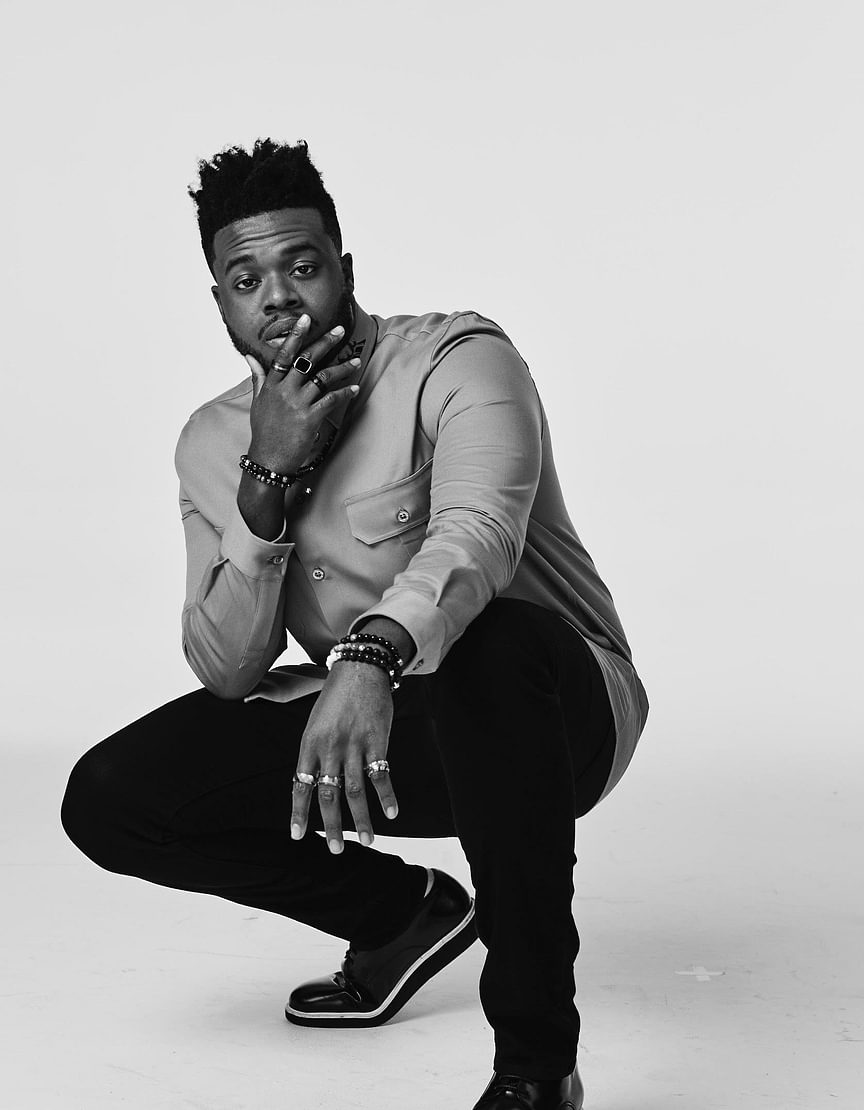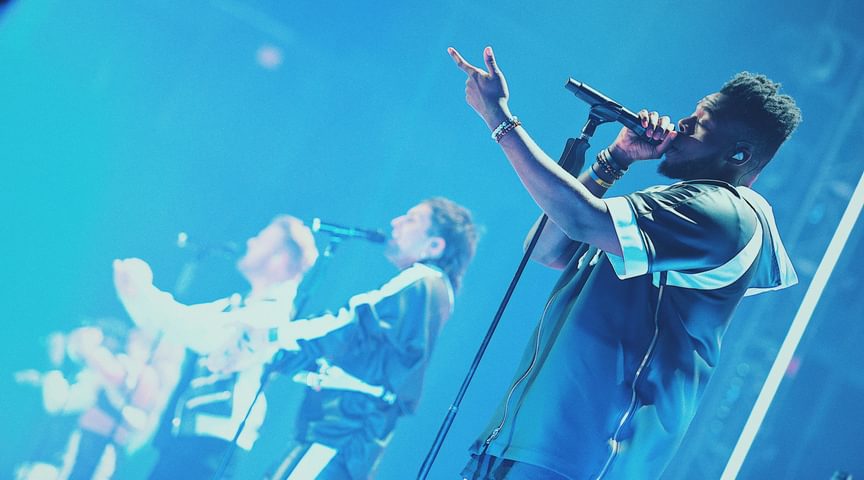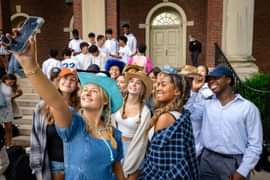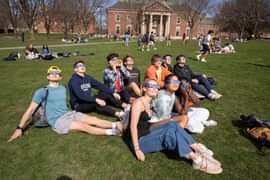
August 19, 2021
Out of the box beats
Kevin Olusola ’06 talks inspiration, the rewards of music, and Andover’s impactby Jennifer Myers
Kevin Olusola ’06 developed the art of cello-boxing (cello and beatboxing together) while studying in China as a Yale University East Asian Studies and pre-med student. Medicine quickly took a backseat to the pursuit of his passion for music. Olusola has been a member of the a capella group Pentatonix for 10 years, during which they won season three of NBC’s competitive reality show, The Sing-Off, as well as three Grammy awards. With Pentatonix, Olusola spent the last decade touring the world and the group’s new album, The Lucky Ones, was released earlier this year. In May, they performed at the Kennedy Center Honors paying tribute to legendary performer Dick Van Dyke—and where Olusola was also able to meet his personal hero, world renowned cellist Yo-Yo Ma P ’01, P’04—“it was one of the highlights of my life,” Olusola says.
Where are you from?
Born in Pasadena, California but I grew up in Owensboro, Kentucky. It was a small town, but I absolutely loved it. I grew up with a Nigerian father who was a psychiatrist and a Grenadian mom who was a nurse, with my two other siblings. Now I live in Los Angeles.
How did you start making music?
My parents told me when I was 6 months old on a car trip they were playing “If You’re Happy and You Know It,” and I would clap at the right time. They thought that was so weird. At 3 years old, my dad bought me an electric piano and this piano would play songs. One of the songs it played was "House of the Rising Sun," so I just memorized the keys and played along with it. One day he was busy and trying to get out of the house and I played it while he was going out and he just stopped and asked how I learned it. That was when he realized he needed to figure out how to cultivate this. From then on, they put me into music lessons—cello, piano, saxophone. I did orchestra, band, jazz band, marching band. I did this because I enjoyed it; I had no desire to make arts a career. I thought I was going to be a doctor. Culturally, when you have immigrant parents in the United States, they want you to have a successful career because there is some stability here that they may not necessarily have had in their own countries. They were pushing for that, but they also wanted me to be fostering my passion.
What was the strongest influence you had when you were growing up?
I listened to so much classical and jazz growing up, contemporary gospel music, Christian rap, and so much Van Cliburn doing piano concertos—especially Rachmaninoff’s No. 2 in C minor. And I listened to a ton of Jacqueline du Prè. She probably had the biggest influence early on in my cello playing because to me, she made the instrument really talk. Truly talk. It wasn’t that she played cleanly; it was more that every human emotion was there. That humanistic way of playing touched me in a deep way.

When was your ‘aha’ moment when you chose to pursue music as a career path?
I started to develop this style of playing, which I call cello-boxing—cello and beatboxing together. I was in China at the Harvard Beijing Academy the summer of my Sophomore year and one of my teachers asked me if I had ever thought of playing the cello and beatboxing together. It didn’t make sense to me at the time because classical music has hundreds of years of this revered pedagogy. I was nervous people would think I was tarnishing it by adding this beatboxing component. But then I think I finally realized that this is what I do uniquely—I play the cello and I beatbox. Who makes the rules of how something is supposed to be done? It is the person who comes to the instrument who gets to decide how it is played. I realized I needed to just be me and try this. I remember the first time I performed this in front of people, they kind of freaked out in China. I started to develop it. Then I did the “Celebrate and Collaborate with Yo-Yo Ma” competition my junior fall semester. I put this piece together in two or three hours because I was focused on my pre-med stuff, and he said my music was inventive and unexpected. To get that from someone at the highest echelon of classical music really impacted me. The other thing was KRS-One, who is one of the grandfathers of hip-hop, I got to do a performance for him with a fellow rapper that I would play cello and beatbox for and he told me, “if you continue to do this cello-beatboxing thing, I feel you are going to change the way people look at hip-hop and classical music.” It was these two different people on different sides of the music spectrum telling me something very similar. That was when I finally decided I needed to take a closer look at this. The hardest thing for me was to break though the pre-conceived notions I had of what an immigrants’ son is supposed to do.
What’s the best thing about your job?
We have gotten to touch people musically in a way that really hadn’t been done before and that’s really special for me because I think in the music industry there are the titans of the music industry, but in a very narrow scope. It’s pop or hip-hop and you have to fight through all these people. We didn’t really fight people—we just said we are going to be ourselves. We are giving kids an opportunity to see that you don’t need to be a solo singer to make it. You can be a part singer but be an amazing part singer and find other friends and come together to create harmony for people who need that peace and love and joy. That’s special. And our fan base is so unique—a grandmother will come to a show with her daughter and granddaughter, and they’ll all say they love Pentatonix. That’s something that is very rare and very special. I get to explore this passion that I didn’t know was possible for me and I get to do it with four amazing humans who are compassionate, considerate, and we love each other.
What inspires you?
My mom always said, “whatever you do, be extraordinary and uncommon.” I think there is something about coming into music from that standpoint—what’s never really been done before? What hasn’t really been popularized? What is it that people say you can’t do? That is what inspires me.
The beauty about the arts is that it is so vast. Don’t be afraid to explore it. Enjoy the journey of finding out what resonates with you.
”What is your most important tool? Is there something you can’t live without in your studio/creative space?
It’s my phone. The phone has become an amazing tool. I was just listening to a Paul McCartney songwriting seminar. In his day he had to memorize the song because there were no recording devices that you had on hand. The only time he could record was when he got into the studio. On one hand that was good because he knew if he remembered the song, it was catchy, but there were also so many song ideas he forgot about. I don’t get to forget songs—I have voice memo on my phone. I also record sounds on my phone that I can just put into the recording and it makes a really interesting, compressed sound.
What are you listening to/reading/binge watching at the moment; what do you recommend?
I just binge watched The Chosen, it’s about the life of Jesus but it’s cool because it is portrayed from the perspective of his disciples. Jesus is actually funny, which you never see. It is also the biggest crowd-funded show of all time. And if you want me to be really honest . . . my wife loves The Real Housewives of Beverly Hills and I’ve watched a little bit of that and it is hilarious. It doesn’t feel like a Philippian thing to do, but it is hilarious, and I am weirdly interested in these women’s lives.
Who is your art/music hero and why?
Yo-Yo Ma. He’s such a magnanimous human. He is so loving. When I met him, he gave me the biggest hug and was so interested in what I wanted to say. He’s the antithesis of everything “Hollywood.”
Do you have a dream project?
I think I’m working on it, but I can’t talk about it. I will say it is a mix of everything that I am from classical music to world music.
If you weren’t making music, what would you be doing instead?
I am fluent in Chinese. I thought I was going to be a doctor who was doing a lot of missionary work in China and Africa, and hopefully the Caribbean.
What did you learn at Andover that still benefits you today?
When I came to Andover, I knew I was a smart kid, but I was a little bit of a mess. I didn’t know how to manage my time and I had never really been challenged. I found out what some of my weaknesses were and had the opportunity to work on them. These are things I have carried into my career because if you don’t know how to manage your time you don’t know how to manage your life. As an artist there are so many demands on your time. Also, having a liberal arts education at the highest level has given me the confidence to walk into any room.
What is your advice for an Andover student who is just beginning to explore the arts?
Keep a very open mind. The beauty about the arts is that it is so vast. Don’t be afraid to explore it. Enjoy the journey of finding out what resonates with you.
What is in store next for you—anything you’re currently working on that you’d like to share?
The band just released a new original album, The Lucky One, in February. We are about to figure out what the next decade of Pentatonix looks like.
Other Stories

They’re simple and flexible. And increasingly, Andover investors are utilizing them to strengthen what they love at PA.




